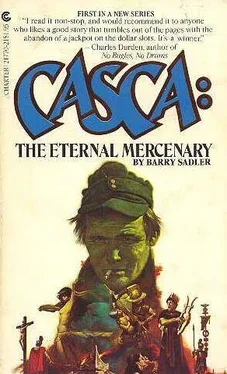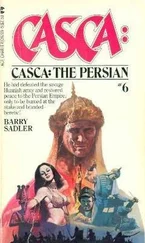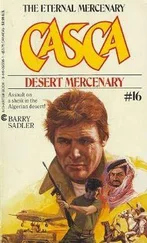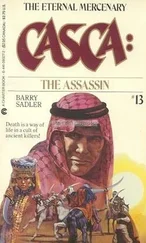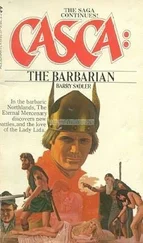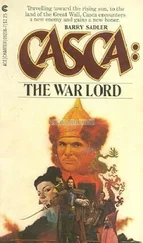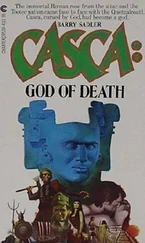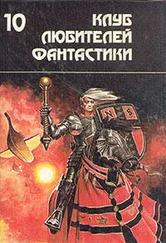Barry Sadler - The Eternal Mercenary
Здесь есть возможность читать онлайн «Barry Sadler - The Eternal Mercenary» весь текст электронной книги совершенно бесплатно (целиком полную версию без сокращений). В некоторых случаях можно слушать аудио, скачать через торрент в формате fb2 и присутствует краткое содержание. Жанр: Фэнтези, на английском языке. Описание произведения, (предисловие) а так же отзывы посетителей доступны на портале библиотеки ЛибКат.
- Название:The Eternal Mercenary
- Автор:
- Жанр:
- Год:неизвестен
- ISBN:нет данных
- Рейтинг книги:3 / 5. Голосов: 1
-
Избранное:Добавить в избранное
- Отзывы:
-
Ваша оценка:
- 60
- 1
- 2
- 3
- 4
- 5
The Eternal Mercenary: краткое содержание, описание и аннотация
Предлагаем к чтению аннотацию, описание, краткое содержание или предисловие (зависит от того, что написал сам автор книги «The Eternal Mercenary»). Если вы не нашли необходимую информацию о книге — напишите в комментариях, мы постараемся отыскать её.
The Eternal Mercenary — читать онлайн бесплатно полную книгу (весь текст) целиком
Ниже представлен текст книги, разбитый по страницам. Система сохранения места последней прочитанной страницы, позволяет с удобством читать онлайн бесплатно книгу «The Eternal Mercenary», без необходимости каждый раз заново искать на чём Вы остановились. Поставьте закладку, и сможете в любой момент перейти на страницу, на которой закончили чтение.
Интервал:
Закладка:
Casca was put with Crespa's other personal slaves in a forward hatch. There they made beds as best they could.
It was a fair day, and clear, with the wind coming in from the deserts of Arabia across the Mediterranean, the wind that blew straight toward Rome. It would be an easy voyage. For Casca, the sea road to Rome-and the arena-was clear.
FOURTEEN
Twelve to fifteen days the journey would take, depending upon the winds and the weather. Time enough for rest, Casca thought. He watched the myriad islands of the Cyclades slide by to port and starboard as the galley pushed its ram-fitted nose through the wine-dark sea. It was pleasant to watch the islands and breathe the fresh air of the sea they covered from horizon to horizon. They were like an enormous convoy of strange ships floating on the dark water under the clear blue sky. Like an honor guard of vessels the gods had sent to speed him off on his voyage to freedom.
He smiled inwardly at the childish thought. It had been so many, many years since the images of a child's imagination had played in his brain that this one nonsensical conceit was like a lonely stick of driftwood bobbing on the enormous sea. Well, then. A good omen. Somewhere deep in his mind something was telling him that freedom would come. But he did wonder what the hell the other slaves would think if they knew what had been-however briefly-in his mind.
He would keep to himself during the voyage. Again, as when he was first brought to Seriphos, he felt no trace of seasickness, though, even in these calm waters, the malady had struck many of the other slaves. The gentle roll and slight pitch of the galley served only to give his mind an ease of thought as he rested.
They left the islands. By dawn of the second day at sea, when he went on deck, he could just make out astern the outline of Achaia, the southernmost tip of Greece. They moved out into the islandless waters of what the Greeks called the Ionian Sea, a four-hundred-mile expanse of ocean separating Greece from her conqueror and student, Rome.
The wind failed only twice in ten days. Then the sound of the hortator's gavel pounded the measure and the slaves fell to the stroke. The lash was used sparingly on this ship. The captain had a good set of oarsmen and intended to keep them in good health as long as he could. Only two died on the voyage. One got it from a bleeding disease that loosened his teeth until they fell out. The other casualty resulted from the captain's trying to knock some brains into the head of an oarsman who kept fouling up the stroke; instead the captain knocked the brains out of him when he rapped the fellow's head firmly with his baton. A slight miscalculation concerning the thickness of the slave's skull. It was thinner than the captain thought. Of course, the baton was of hardwood and capped with a silver knob.
Casca had determined to keep to himself during the voyage, but that did not prevent him from observing the other slaves. In the hold where the privately owned slaves were kept there was the usual blending of peoples and races. But one slave was unusual and specially interested him.
He had never seen the like before. The slave was a small man of indeterminate age. He could be anything from forty-five to sixty-five; a wispy gray moustache and beard accented his features. It was hard to tell because of the color of his skin which had a gold cast to it under the sunburn. His eyes were similar to some Casca had seen among travelers from the east who had come to the markets in Jerusalem, except that they seemed more slanted, giving the man a sleepy look. His body was lean and well-muscled.
But it was as much what the man did as what he looked like that made him so damned odd. Every morning and evening he went through a strange ritual of exercises, weaving his body about like a serpent, taking on odd positions and then holding the positions for long periods of time while he performed strange breathing exercises-letting the air hiss out between his teeth and then inhaling and sucking his abdomen in and holding the breath.
Even odder was the way he acted around the other slaves. The little man was quiet and well-mannered, never giving offense when he did not get the choice bits from the pot and even smiling and thanking the bastard who gypped him for being so good as to leave him what he did. Damned curious. Maybe there was something to that bit about a man's brain being touched by the gods.
As the days wore on, Casca watched the other slaves bit by bit take greater and greater advantage of the yellow man until he could no longer contain his curiosity. That night, after the evening meal, he moved to the side of the little man and asked:
"Why do you let them treat you so, yellow man?"
The brown eyes in the slanted epicanthic fold looked steadily at Casca. There was no trace of fear in the man. Whatever was done to him was not done because he was afraid.
The yellow man smiled, his even white teeth shining in the dim light. "Not tonight, my monstrous barbarian. Sleep tonight. Tomorrow I will answer your questions, for it is as the Lord Confucius said that to teach is to learn. Tomorrow we will both learn more."
As he lay on his pallet that night, Casca thought about the strange little man with the flashing eyes, but he finally gave up trying to fathom what the yellow slave meant and, giving a grunt, rolled over on his right side and let the creaking of the ship's wooden sides lull him to sleep.
And when the new day came with its sameness to all the other days of the voyage he had practically dismissed the yellow man from his mind.
Until the evening meal, that is.
The slaves' rations were lowered down to them in a large black kettle, one that-from the look of it-had seen service in the fleet for at least a hundred years. All meals were prepared at the only place on the ship where a fire could be lit, an open area covered with sand, a brass brazier serving as stove. Fire was the single most feared disaster on board the galleys.
With the kettle lowered, the slaves stood in line to dip their rations out of the pot and into their personal bowls. Naturally Casca took his place in the front of the line. He was the strongest, and the strongest always feed first.
He took his bowl of meaty fish stew to his bunking area and sat cross-legged and ate, dipping the pieces of fish out with his fingers, occasionally smacking his lips over a morsel.
A commotion by the pot drew his attention.
The yellow man was having problems.
He had awaited his turn at the pot patiently, content to be the last in line, even to the extent of giving an elderly slave a spot in front of him-and bowing politely while he did it.
When he had taken his own serving-and there was precious little left at the bottom of the pot- two of the younger slaves decided to have some fun with the little man. One was a young man of perhaps twenty, fair-haired and with pleasant-enough features-though a close look would show a mean set to the mouth. The other was of mixed blood, perhaps Greek and Persian. The half-breed was large and strong, and had more than once thought about challenging Casca for the first position. He had, however, apparently seen something in the legionary that told him to leave well enough alone, so Casca had not had the pleasure of whipping his ass. But the yellow man was something else-and fair game.
When little slant-eyes had taken his bowl and started back for his area, the blond young slave tripped him, knocking his food to the floor. The blond and the breed thought this great fun and suggested that the yellow one eat his food from the floor like a dog, seeing as how he was obviously an animal of some kind, perhaps even a new type of monkey.
The yellow man arose from the deck. Smiling, he wiped the stew from his saffron-colored robe and turned to face the two men. Bowing, he asked politely:
Читать дальшеИнтервал:
Закладка:
Похожие книги на «The Eternal Mercenary»
Представляем Вашему вниманию похожие книги на «The Eternal Mercenary» списком для выбора. Мы отобрали схожую по названию и смыслу литературу в надежде предоставить читателям больше вариантов отыскать новые, интересные, ещё непрочитанные произведения.
Обсуждение, отзывы о книге «The Eternal Mercenary» и просто собственные мнения читателей. Оставьте ваши комментарии, напишите, что Вы думаете о произведении, его смысле или главных героях. Укажите что конкретно понравилось, а что нет, и почему Вы так считаете.
